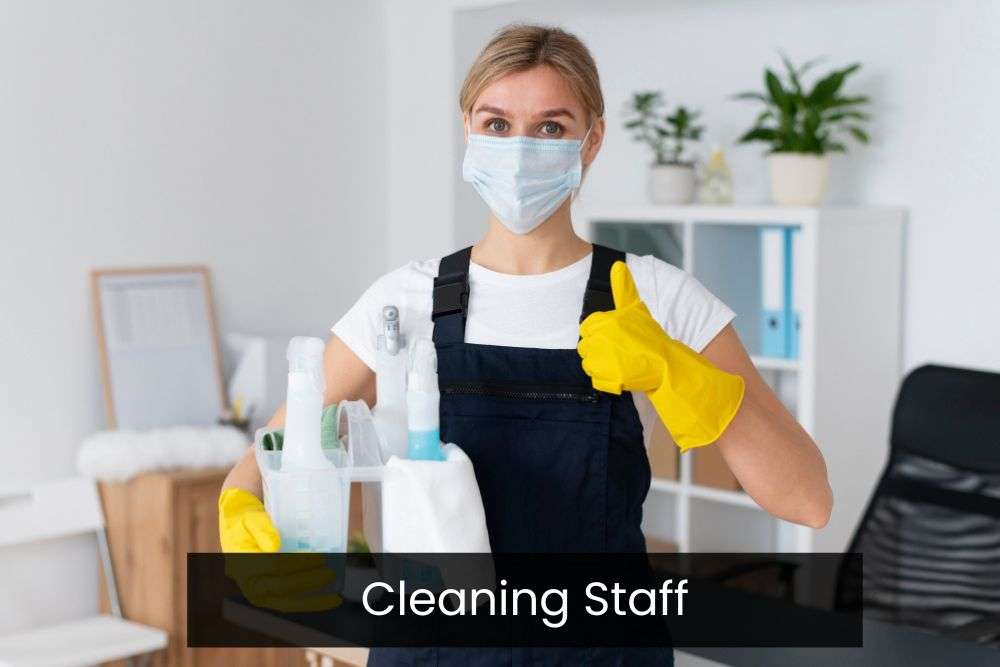Recruiting the right accommodation staff is not just about filling positions; it’s about curating an experience for guests that goes beyond the physical facilities. These individuals are the face of your establishment, influencing the first and lasting impressions of visitors. A skilled and well-suited accommodation team can transform a stay into a memorable journey, ensuring guests return and spread positive word-of-mouth.
Key Takeaways
- Retain Carefully: Create a positive environment, recognize achievements, and assess satisfaction for a loyal team.
- Smart Recruitment: Tailor strategies, use online platforms, network, and craft compelling ads for diverse and qualified candidates.
- Adapt & Train: Prioritize ongoing training, adapt to trends, and integrate technology for superior guest services.
- Values Matter: Ensure candidates align with your values to enhance team culture and guest experience.
- Stay Savvy: Stay updated on trends, integrate tech, and train staff for a competitive edge in the dynamic hospitality landscape.
The role of accommodation staff extends far beyond routine tasks. They serve as ambassadors, creating the atmosphere that sets the tone for a guest’s entire visit. From the warm welcome at check-in to the attentive service during the stay, the staff’s demeanour, efficiency, and interpersonal skills directly impact guest satisfaction. Positive interactions contribute to a favourable overall experience, fostering loyalty and positive reviews.
1 Identifying Your Needs
A. Assessing the Specific Requirements of Your Accommodation Facility
Understanding the unique needs of your accommodation facility is the foundation of effective recruitment. Consider the size, style, and target audience of your establishment. For instance, a boutique hotel may prioritize a personalized approach, while a large resort might emphasize efficiency. By identifying these specifics, you can tailor your recruitment strategy to find individuals who align with your establishment’s character and goals.
Looking for Accommodation Staff?
Call us at 087 738 8306 or Fill the form below and we will get back to you ASAP.
B. Creating a Detailed Job Description for the Accommodation Staff Position
Crafting a detailed job description serves as a roadmap for both recruiters and potential candidates. Clearly outline responsibilities, expectations, and any unique aspects of the role. Include information about work schedules, customer service expectations, and any specialized skills required. This not only attracts candidates with a genuine interest in the position but also helps filter out those who may not be the right fit.
C. Determining the Necessary Skills and Qualifications
Beyond the basics, determine the specific skills and qualifications crucial for success in the role. This could range from proficiency in multiple languages for a concierge position to problem-solving skills for front desk staff. Identify the qualities that will contribute to a positive guest experience and align with your accommodation’s values. This ensures that the candidates possess not only the technical skills but also the cultural fit for your establishment.
Pro Tip: Consider involving current staff members in this process. They can provide valuable insights into the day-to-day requirements of the job and the characteristics that contribute to a successful team.
2 Recruitment Strategies
A. Utilizing Online Job Platforms to Reach a Wider Audience
In the digital age, online job platforms have become the go-to destination for both job seekers and recruiters. Leveraging platforms like LinkedIn, Indeed, or specialized hospitality job portals broadens your reach to a diverse pool of talent. This approach not only increases the quantity of applicants but also allows for a more comprehensive selection process, ensuring you find candidates with the specific skills and experiences needed for your accommodation staff.
B. Networking Within the Hospitality Industry for Potential Candidates
Networking remains a powerful tool in the hospitality industry, where personal connections often lead to exceptional hires. Attend industry events, engage in online forums, and participate in professional associations. Building relationships with peers can uncover hidden gems—talented individuals who may not be actively job-seeking but are open to exciting opportunities. Word of mouth within the industry can bring you candidates with proven track records and a passion for hospitality.
C. The Significance of a Well-Crafted Recruitment Advertisement
Your recruitment advertisement is the first impression potential candidates have of your establishment. Crafting an engaging and informative ad is not just about listing qualifications; it’s about showcasing your accommodation’s unique culture and the opportunities it provides. Highlight the benefits of working with your team, the growth potential within the organization, and any distinctive perks. A well-crafted advertisement not only attracts qualified candidates but also sets the stage for a positive employer-employee relationship.
3 Interviewing Techniques
A. Conducting Structured Interviews to Evaluate Candidate Suitability
Structured interviews provide a systematic approach to assessing candidates. Develop a set of standardized questions that directly align with the skills and qualities required for the accommodation staff position. This consistency allows for fair comparisons between candidates. Pay attention not only to the content of their responses but also to their communication style, enthusiasm, and alignment with your accommodation’s values.
B. Asking Situational Questions to Gauge Problem-Solving Abilities
Situational questions present candidates with hypothetical scenarios they may encounter in their role. This technique goes beyond assessing theoretical knowledge, focusing on problem-solving abilities and decision-making skills. For example, asking how a candidate would handle a challenging guest situation or a sudden influx of reservations provides insights into their adaptability and capacity to think on their feet—critical qualities for accommodation staff.
C. Assessing Interpersonal Skills Crucial for Guest Interaction
Interpersonal skills are at the core of successful guest interactions. During interviews, pay close attention to how candidates communicate, their body language, and their ability to connect with others. Consider scenarios where strong interpersonal skills are vital, such as handling guest complaints or collaborating with colleagues. Assess their empathy, patience, and ability to maintain a positive demeanour under pressure—essential attributes for creating a welcoming and pleasant guest experience.
Pro Tip: Incorporate role-specific scenarios into the interviews. For instance, ask candidates how they would handle a situation where a guest has a special request or a unique need, emphasizing the practical application of their skills in the accommodation setting.
4 Background Checks and References
A. Importance of Thorough Background Checks for Reliability
Ensuring the reliability of your accommodation staff is paramount to maintaining the integrity of your establishment. Thorough background checks delve into a candidate’s criminal history, verifying their identity, and confirming their eligibility to work. This step mitigates potential risks, safeguarding your guests and the reputation of your accommodation. A comprehensive background check is not just a precautionary measure but an investment in creating a secure and trustworthy environment.
B. Checking References to Verify Work History and Performance
References offer valuable insights into a candidate’s past performance and behavior in the workplace. Contacting previous employers allows you to verify the accuracy of the candidate’s work history, confirming the roles they held and the responsibilities they undertook. This step goes beyond the information presented in a resume, providing a more holistic understanding of the candidate’s strengths, weaknesses, and overall work ethic. It’s a crucial step in ensuring the candidate possesses the qualities necessary for success in your accommodation.

C. Ensuring the Candidate Aligns With Your Accommodation’s Values
An accommodation’s success is not just about delivering a service; it’s about creating an experience aligned with your establishment’s values. During the hiring process, assess whether the candidate’s personal values align with those of your accommodation. This alignment ensures a cohesive team culture, where every staff member contributes to the shared goal of providing exceptional service. A values-based approach promotes unity and a sense of purpose among your accommodation staff.
Table: Benefits of Background Checks and References
| Benefits | Description |
|---|---|
| Risk Mitigation | Thorough background checks reduce the risk of hiring individuals with a history that may pose a threat. |
| Confirmation of Qualifications | References confirm the accuracy of a candidate’s qualifications and validate their past performance. |
| Cultural Fit Assessment | Checking references helps evaluate if a candidate aligns with the values and culture of your accommodation. |
| Enhanced Guest Trust | A reliable and trustworthy staff contributes to building trust among guests, enhancing their overall experience. |
5 Onboarding Process
A. Developing a Comprehensive Onboarding Program for New Staff
The onboarding process sets the tone for an employee’s journey within your accommodation. Develop a comprehensive onboarding program that introduces new staff to the culture, values, and expectations of your establishment. This program should go beyond administrative tasks, incorporating elements that foster a sense of belonging and understanding of their role in creating a positive guest experience.
B. Training on Accommodation Policies, Procedures, and Guest Service Expectations
Effective onboarding involves thorough training on accommodation-specific policies and procedures. Equip new staff with the knowledge and skills needed to navigate daily tasks, handle guest interactions, and adhere to the highest standards of service. This not only ensures consistency in service delivery but also instils confidence in your staff, enabling them to perform their roles with excellence from the outset.
We provide industry standard expert vetted Online training programs for Staff to perform well in your organization, We provide Certifications for each Courses. You may check our Courses here and enroll them. If you are a Candidate and looking to upgrade your skills to boost your career, you can directly join our Courses here.
C. Providing Ongoing Support and Feedback During the Initial Period
The initial period of employment is critical for a new staff member’s integration and development. Offer continuous support through mentorship programs, regular check-ins, and constructive feedback. This ongoing engagement helps address any challenges promptly, reinforces positive behaviors, and cultivates a sense of commitment. A supportive onboarding process lays the foundation for a motivated and engaged accommodation staff.
Table: Key Components of an Effective Onboarding Process
| Components | Description |
|---|---|
| Introduction to Culture and Values | Welcoming new staff to the accommodation’s culture and values, fostering a sense of belonging. |
| Role-Specific Training | Comprehensive training on job responsibilities, policies, and procedures unique to the accommodation. |
| Mentorship Programs | Pairing new staff with experienced mentors for guidance and support during the initial period. |
| Regular Feedback Mechanisms | Establishing regular feedback sessions to address concerns, provide guidance, and acknowledge achievements. |
Pro Tip: Incorporate interactive elements into the onboarding process, such as team-building activities and shadowing opportunities, to enhance engagement and integration.
Looking for Accommodation Staff?
Call us at 087 738 8306 or Fill the form below and we will get back to you ASAP.
6 Retention Strategies
A. Creating a Positive Work Environment to Reduce Turnover
A positive work environment is not just a perk; it’s a strategic investment in staff retention. Fostering a workplace culture that values collaboration, open communication, and employee well-being significantly reduces turnover. When accommodation staff feel supported and appreciated, they are more likely to remain committed to their roles. This positive atmosphere contributes to job satisfaction and, consequently, the longevity of your team members.
B. Recognizing and Rewarding Exceptional Performance
Recognition is a powerful motivator. Regularly acknowledging and rewarding exceptional performance creates a culture of appreciation and incentivizes staff to consistently excel. Whether through employee of the month programs, performance bonuses, or simple gestures of gratitude, recognizing the efforts of accommodation staff reinforces their value and contributes to job satisfaction. This proactive approach not only boosts morale but also serves as a preventative measure against potential burnout.
C. Regularly Assessing Employee Satisfaction and Addressing Concerns
Employee satisfaction is dynamic, and regular assessments provide crucial insights into the overall well-being of your accommodation staff. Implement surveys, feedback sessions, or anonymous suggestion boxes to gather input on workplace satisfaction. Actively address concerns, ensuring that staff feel heard and supported. By proactively addressing issues, you demonstrate a commitment to the well-being of your team, fostering trust and loyalty.
Table: Impact of Retention Strategies on Accommodation Staff
| Retention Strategy | Impact on Accommodation Staff |
|---|---|
| Positive Work Environment | Reduces turnover, boosts morale, and enhances job satisfaction. |
| Recognizing Exceptional Performance | Motivates staff, fosters a culture of excellence, and prevents burnout. |
| Regular Employee Satisfaction Checks | Provides insights into staff well-being, addresses concerns promptly, and builds trust within the team. |
7 Adapting to Industry Trends
A. Staying Updated on the Latest Hospitality Industry Trends
The hospitality industry is dynamic, with trends constantly evolving. Staying informed about the latest trends is essential for keeping your accommodation competitive. Regularly attend industry conferences, engage in online forums, and subscribe to relevant publications to stay ahead. Being proactive in understanding emerging trends allows your accommodation staff to adapt swiftly, ensuring that your services remain modern and appealing to guests.
B. Integrating Technology for Improved Guest Services
In an era where technology shapes guest expectations, integrating the latest tools enhances the overall guest experience. Implementing advanced reservation systems, contactless check-in processes, and smart room technologies not only streamline operations but also contribute to guest satisfaction. Training accommodation staff to use and leverage these technologies ensures a seamless and modernized service, meeting the expectations of tech-savvy guests.
C. Training Accommodation Staff to Adapt to Changing Guest Preferences
Guest preferences are ever-evolving, influenced by cultural shifts, travel trends, and global events. Training your accommodation staff to adapt to these changes is crucial for meeting diverse guest expectations. This involves cultural sensitivity training, staying attuned to global travel trends, and offering flexibility in services. An adaptive staff is better equipped to provide personalized experiences that resonate with the varied preferences of today’s travelers.
Table: Adapting to Industry Trends in Hospitality
| Adaptation Strategy | Impact on Accommodation Services |
|---|---|
| Staying Updated on Trends | Enhances competitiveness, ensures relevance, and allows for proactive adjustments to meet evolving guest expectations. |
| Integrating Technology | Improves operational efficiency, enhances guest convenience, and positions the accommodation as tech-forward. |
| Training for Changing Preferences | Ensures staff can provide personalized experiences, creating a positive impact on guest satisfaction and loyalty. |
Conclusion
In conclusion, recruiting and managing accommodation staff involves a multifaceted approach. From the meticulous recruitment process to the implementation of retention strategies and adaptation to industry trends, each step contributes to the overall success of your establishment. By prioritizing the right recruitment criteria, fostering a positive work environment, and staying attuned to industry shifts, accommodation providers can create a winning formula for exceptional guest experiences and sustained success in the ever-evolving hospitality landscape.
- Staff for Hotel Business: Choose the Perfect Recruitment Agency
- Chefs for Hotel: A Comprehensive List of Things to Consider
- Bartender Staff: Things to consider while recruiting Bartenders
- Waiter Staff: Things to consider while recruiting Waiters
- Kitchen Porter staff: Things to consider while recruiting Kitchen Porters











